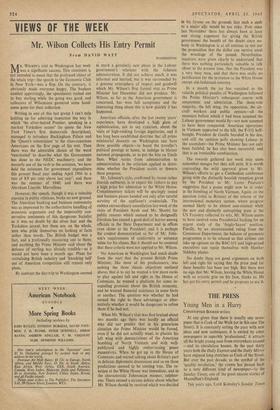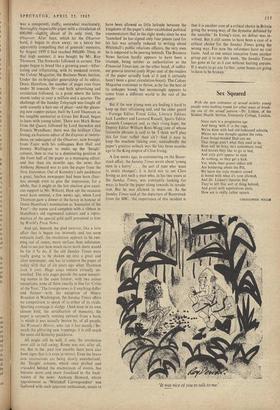CHRISTOPHER BOOKER writes: At any given time there is usually
one news- paper that is Cock of the Walk (or in this case The Street). It is constantly setting the pace with new ideas and new techniques, it is envied by other newspapers as superbly 'professional,' it attracts all the bright young men from everywhere around —and its circulation booms. In the past thirty years both the Daily Express and the Daily Mirror have enjoyed long stretches as Cock of the Street. But over the past decade, as the symbol of the 'quality revolution,' the crown has passed back to a very different kind of newspaper—to the Sunday Times, one of the great success stories of Macmillan's England.
Ten years ago, Lord Kemsley's Sunday Times was a competent, stuffy, somewhat reactionaiy, thoroughly respectable paper with a circulation of 600,000—slightly, ahead of its only rival, the Observer. After Suez, which hit the Observer • hard, it began to draw away; on a heavy but apparently compelling diet of generals' memoirs, by August 1959 it had reached 900,000. Then, in that high summer, it was bought by Mr. Roy Thomson. The fireworks followed in earnest. The paper began to breed like .a growing yeast—bifur- cating and trifurcating, with its weekend review, the Colour Magazine, the Business News Section. Under the ex-brigadier generalship of its editor, Denis Hamilton, the number of pages rose from under 30 towards 50—and both advertising and circulation followed, to a point where the latter stands today at over a million and a quarter. The challenge of the Sunday Telegraph was fought off with scarcely a hair out of place—and the gleam- ing new copper palace, built by Lord Thomson as his tangible memorial in Grays Inn Road, began to hum with young talent. There was Mark Boxer from the Queen, followed by Lord Snowdon and Francis Wyndham; there was the brilliant Clive Irving, ex-features editor of the Express at twenty- three, ex-redesigner of the Observer, now brought from Topic with his colleagues Ron Hall and Jeremy Wallington to make up the 'Insight' column, then to rise to a dominating position in the front half of the paper as a managing editor; and less than six months ago, the news that Anthony Howard was to join the paper from the New Statesman. Out of Kemsley's safe packhorse a great, fearless newspaper had been born (fear- less enough even to give the impression, for .a while, that it might at the last election give cauti- ous support to Mr. Wilson). How apt the occasion must have seemed, a few weeks ago, when Lord Thomson gave a dinner at the Savoy in honour of Denis Hamilton's nomination as 'Journalist of the Year'—the menu card complete with a ribbon in Hamilton's old regimental colours and a repro- duction of the special gold quill presented to him by World's Press News.
And yet, beneath the glad exterior, like a love affair that is begun too intensely and too soon exhausts itself, the revolution appears to be run- ning out of steam, more surface than substance. And to see just how much more work there would be for it 'to do, if the old Sunday Times were really going to be shaken up into a great and alive newspaper, one has to compare the paper of today with that of six years ago when Thomson took it over. Huge areas remain virtually un- touched. The arts pages parade the same unexcit- ing names in the same format; with two minor exceptions, none of them exactly in line for 'Critic of the Year.' The foreign news is if anything duller and thinner—with the exception of Henry Brandon in Washington, the Sunday Times offers no competition to speak of to either of its rivals.
Sporting coverage is stodgy. (And even in its own chosen field, the serialisation of memoirs, the
paper is currently running extracts from a book to which it was actually beaten by, of all people, the Woman's Mirror, who ran it last month.)'Be- neath the glittering new trappings, it is still much the same old Kemsley packhorse.
All might still be well, if only the revolution were still in full swing; Rome was not, after all, etc. But in the past few months there have also
been signs that it is even in retreat. Even the brave new innovations are being slowly anaesthetised;
the 'Insight' column, which once probed and crusaded behind the mainstream of events, has become more and more fossilised in the back- waters of the news. Anthony Howard, whose appointment as 'Whitehall Correspondent' was fanfared with such apparent enthusiasm, seems to
have been allowed so little latitude between the kingdoms of the paper's older-established political commentators that in the eight weeks since he was 'launched' he has signed only four pieces (and for his last was actually reduced to writing about Whitehall's public relations officers, the very men he is supposed to be peering behind). The Business News Section hardly appears to have been a triumph, being neither as authoritative as the Financial Times nor, on the other hand, of suffici- ent general interest,(only 30 per cent of the readers of the paper actually look at it and it certainly hasn't been a great circulation-boost). The Colour Magazine continues to thrive, as by far the best of its unhappy breed, but increasingly appears to come from a different world to the rest of the paper.
But if the new young men are finding it hard to keep up their reforming end, and the older guard —Foreign Editor Frank Giles, Literary Editors Jack Lambert and Leonard Russell, Sports Editor Kenneth Compston and, as their rising hope, the Deputy Editor William Rees-Mogg (one of whose favourite phrases is said to be 'I think we'll "play this for four rather than six')—find it easy to keep the machine ticking over, undoubtedly the paper's greatest setback was the loss three months ago to the King empire of Clive Irving.
A few weeks ago, in commenting on the Bayer- stock affair, the Sunday Times wrote about 'yming men in a hurry' . . . the sort of men who 'want to make changes'; it is hard not to see Clive Irving as .just such a man who, in his two years at the Sunday Times, was constantly looking for ways to hustle the paper along towards its revolu- tion. But he was allowed to move on. As the Sunday Times said of the departure of Baverstock from the BBC, 'the importance of this incident is that it is another case of a critical choice in Britain going the wrong way, of the dynamic defeated by the amiable.' In Irving's case, no defeat was in- volved. But it still seems to have been a case of a critical choice for the Sunday Times going the wrong way. For now the reformers have no real focus. And as one senior executive from another group put it to me this week, 'the Sunday Times has gone as far as it can without hurting anyone. If it wants to go any farther, some bones are going to have to be broken.'































 Previous page
Previous page